‘Heart of our City’ March/April 1991
The Heart of our City photographic project was part of a collaborative initiative called ‘Healthy Sheffield 2000’. It sought to prevent coronary heart disease (CHD) through education and information and in doing so reduce the inequalities in heart health between different parts of Sheffield.
The purpose of this section of the project was to record individual experiences through photographs and interviews that describe a persons vulnerability to CHD caused by stress.
CHD has long been associated with poverty, poor diet, smoking, lack of exercise, obesity, diabetes and genetic inheritance.
However this part of the project was intended to prove the link that living with high levels of stress exacerbates a persons risk to CHD. The inability to improve or change a situation caused by environmental and social conditions that are beyond a persons control are the driving force of stress related CHD.
The environmental and social conditions described in these interviews and photographs that aggravate and contribute to stress that lead to CHD include: heavy manual labour, constant financial worries, noise and air pollution, social isolation, bereavement, caregiver burnout, unemployment, redundancy, traumatic injury and racism.
This exhibition was financially supported by Sheffield Health Promotion Centre and exhibited as part of a group show at Site Gallery, Sheffield in August 1991.
Interviews where recorded on a tape recorder and later transcribed.
All images are Strictly Copyright © Bill Stephenson All Rights Reserved
Billy Gates
“I’ve been working at this foundry as a stamper at Turton and Platts for 24 years, since I was 20. It’s a good firm to work for, the gaffers fair, I’ve mates here and the money’s OK. I get about £55.00 for the 6am to 2pm shift. Its piece work so its up and down. Health wise the drawbacks from this job are aches, rheumatism, bad chest and loss of hearing. I also suffer from eczema and I guess that has a lot to do with the job.
I’m worried how I’ll be able to carry on when I’m older. Nobody can do this job until retirement age, most are finished by 55. Men used to be put on light work in another part of the foundry at that age, now they are paid off (made redundant). Although this is hard work, I don’t think I’ll cope when I’m paid off.
Sometimes it gets so hot in summer you have to stop work, but because you are on a piece rate, you have to keep going. In winter with the heat of the furnace on your front and the cold on your back, that puts a strain in you. You keep going because you can’t let your mates down.
I’ve three children and I wouldn’t want them to work here, there are better jobs than this anywhere”.

[HC 01] Billy Gates (centre) with his work mates.

[HC 02] Billy (front) heating a steel ingot in a furnace. The steel ingot is held in the furnace by long tongs until it is malleable enough to be shaped in a drop stamping forge.
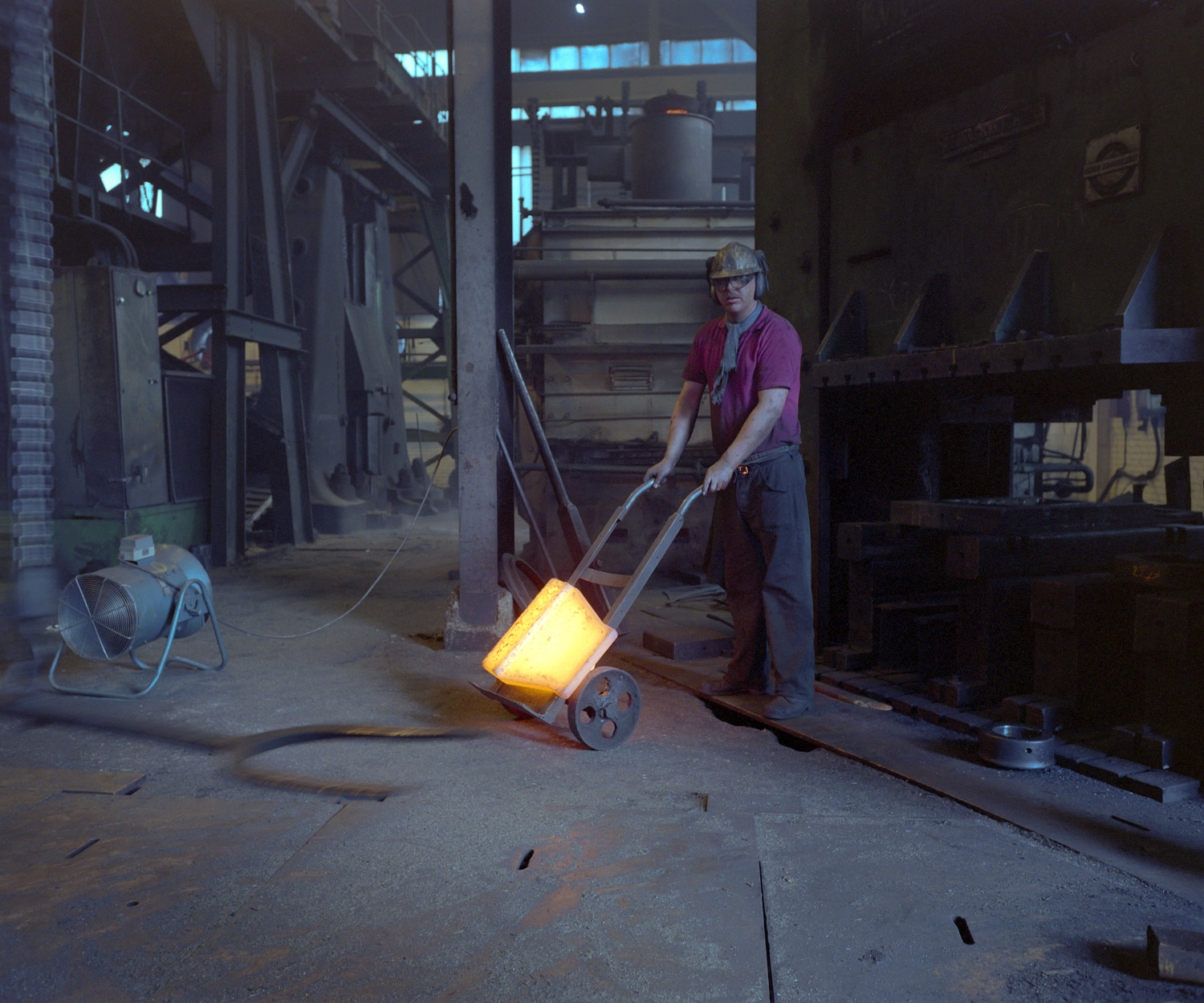
[HC 03] Billy moving the red hot steel ingot in a trolley from the furnace to the drop stamping forge.
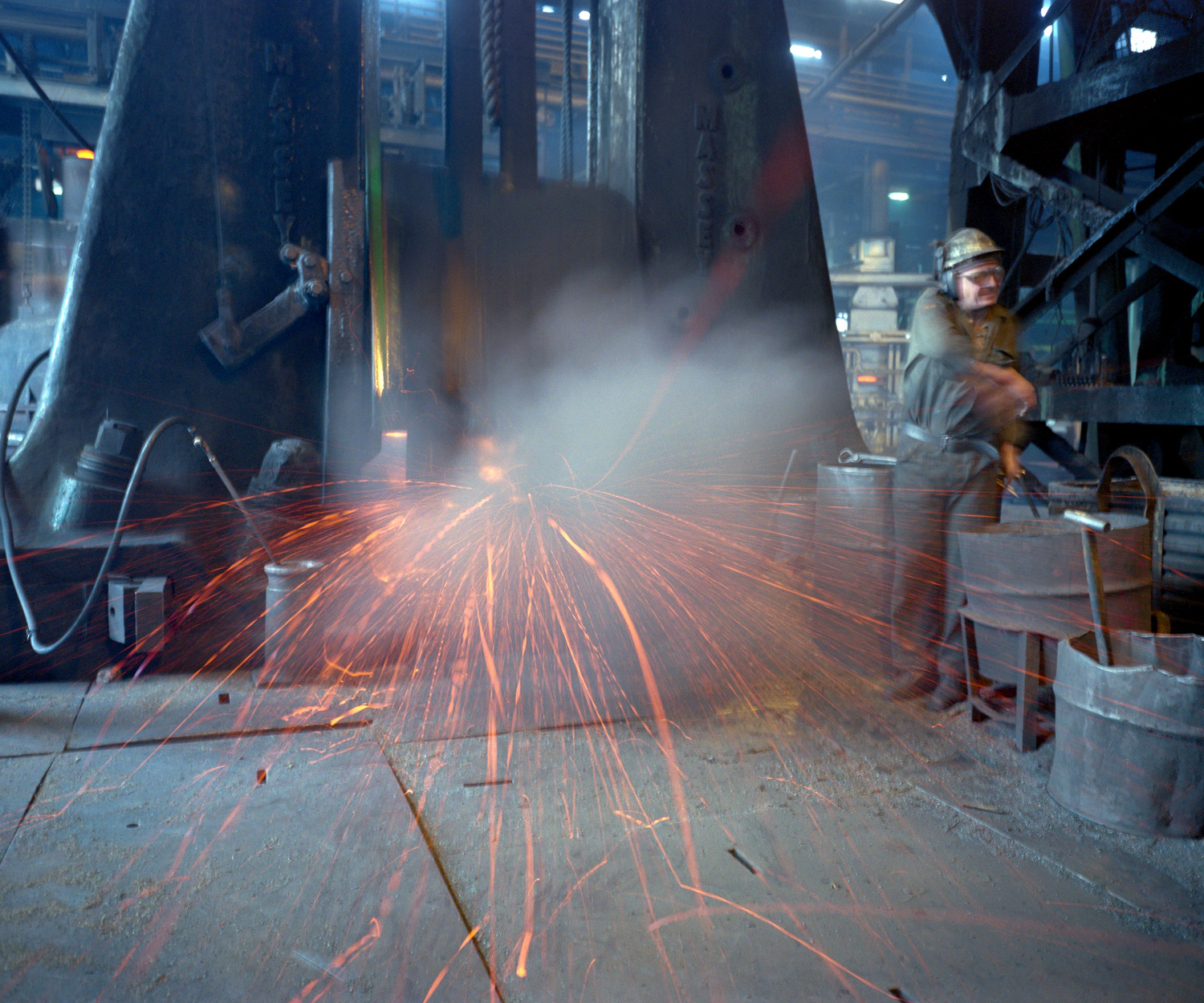
[HC 04] The drop stamping forge in operation.
George Turton, Platts and Co Ltd was located on Saville Street, Sheffield. They manufactured railway buffers, springs and associated stampings. During WW2 they made aircraft engine crank cases and cylinder linings. The company was established in 1882 and went into voluntary liquidation in 2011.
Gaynor Prescott
“I left home when I was 14. I’d met a lad from a fairground and travelled around with him. I worked on the hot dog stand, but got fed up of standing in the cold all day. When I wanted to come home my parents wouldn’t have me back, so I’ve been on my own ever since.
I’ve got three kids now, Lotte, Amber and Julie, I had Julie when I was 17, I’m 21 now and live on my own. I don’t mix with any girls of my age who don’t have kids, they can’t stand them for long, so I spent most of my time alone. Apart from going out for a couple of hours on my 21st birthday, I have not been out much since I was 17.
My hardest problem is trying to pay my bills when they come in, with two babies in nappies money is soon gone. I’m left each week after my bills with £20-30 for food and clothes for the four of us. I make sure the kids get everything, but it means I have to do without. I’ve needed a new pair of shoes for the last 3 years. I’ve been saving the family allowance for the last two months to buy some new tracksuits. Their dad don’t pay anything for the kids because he does not work and hasn’t any money.
I feel I’m missing out on going to work and earning some decent money. I keep myself going by thinking when they grow up I’ll still be young enough to do things I want to do, and then I’ll have my life back. I’m fed up of sitting by the fire pulling my hair out “.
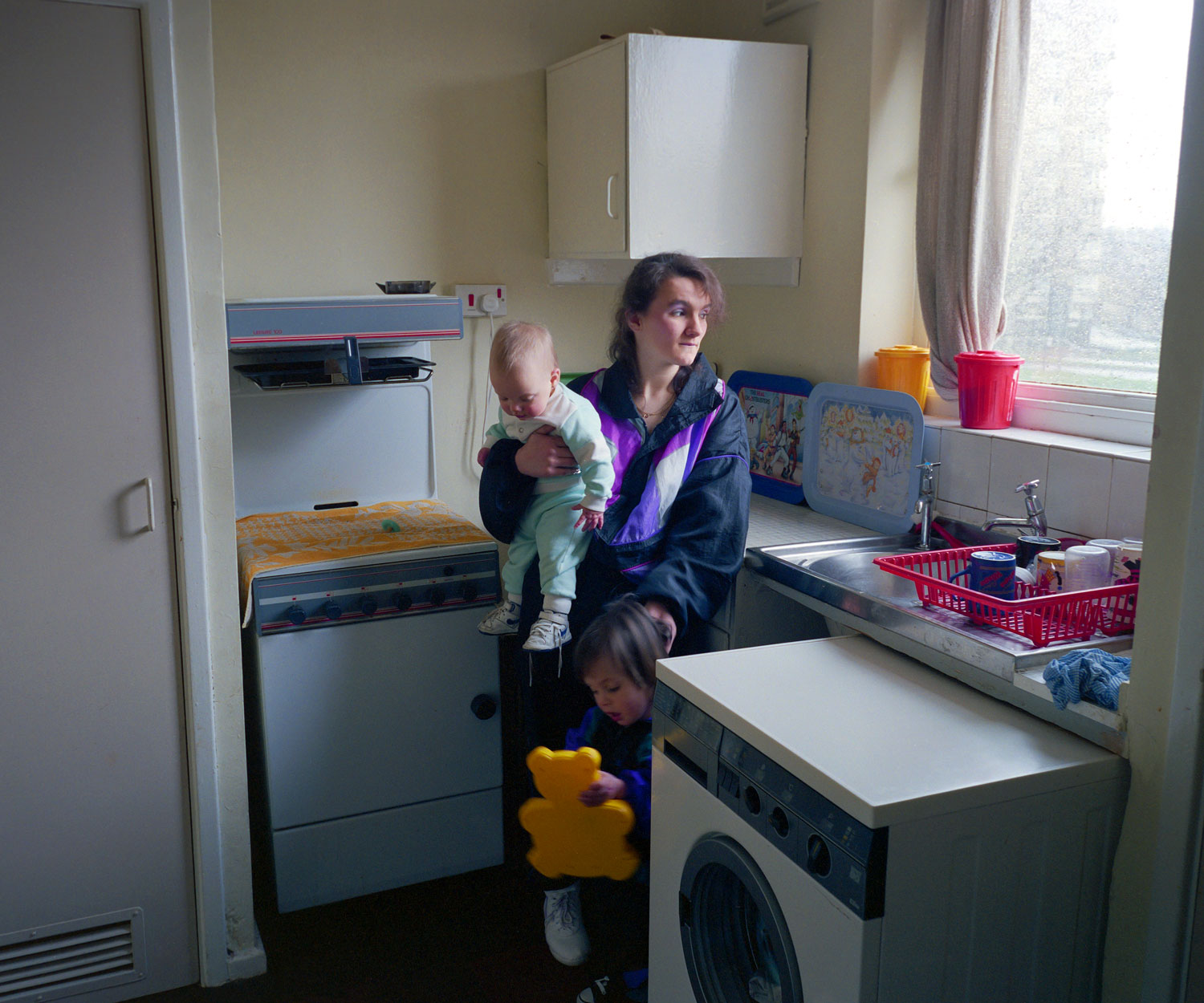
[HC 05] Gaynor with two of her children in the kitchen.

[HC 06] Gaynor contemplates her life.

[HC 07] Gaynor bottle feeds her new baby.
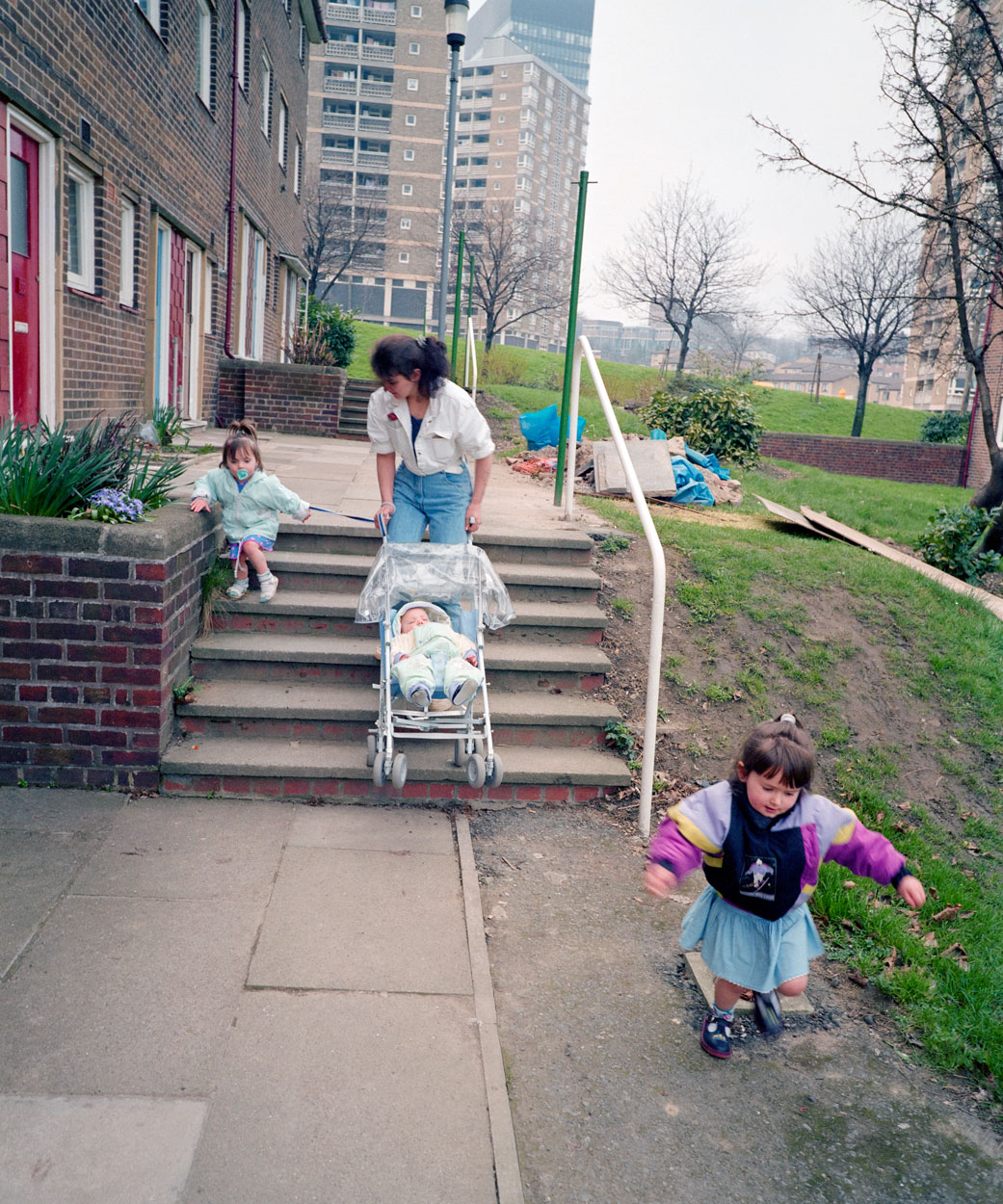
[HC 08] Gaynor takes her children out to Crookes Valley Park to play.
George Turner
“I moved here to the Edward Street Flats with my mother in 1940, I now live here with my son Eric. I had a stroke 3 years ago and have had to give up work as a porter at the university, the stroke has affected my balance and so I spend a lot of time in this room.
The council has been working on this building opposite for the last 12 months and its expected to go on for another 12. During this time I have had to put up with the disruption, dust and noise daily from 8.00am until 4.30pm. Its the drilling and engine noise of the heavy crane when it’s lifting that’s worse. All I can do is turn the television up and try to drown out the noise. I know we could have been moved by the council, but I don’t want to move, I’ve been here too long too change.
Perhaps what’s worst is that the noise is regular. I’ve always lived quietly and all this noise causes a strain for me, its always there and is its very hard to get away from it. Its hard to concentrate on anything other than the constant aggressive noise, it upsets your nerves. It’s like having your privacy invaded everyday at 8am“.
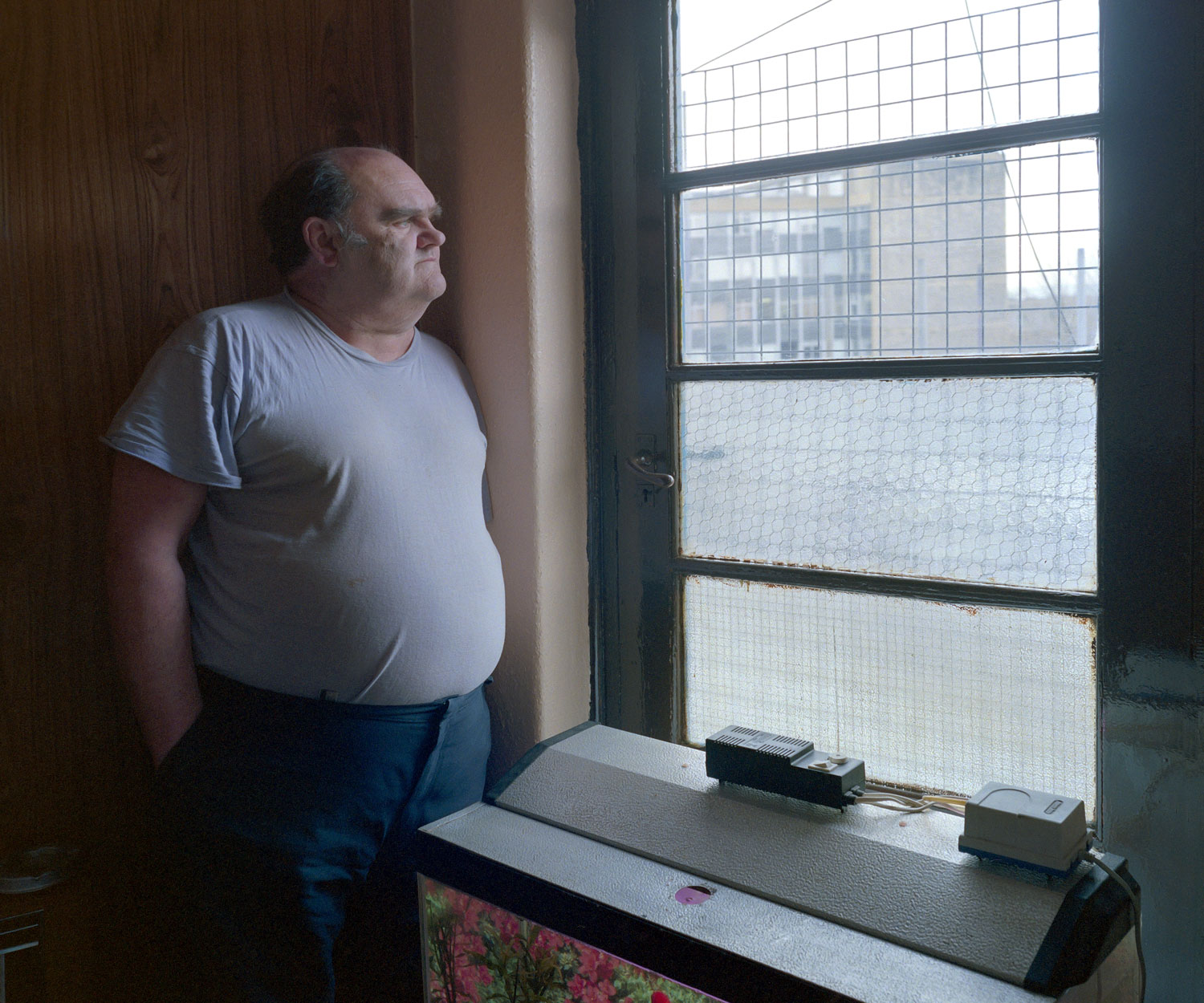
[HC 09] George watches the building work opposite.

[HC 10] George watches the building work opposite. His TV is on all day to drown out the sound of building work opposite his flat.

[HC 11] George has his TV volume turned up high in an attempt to mask the noise from outside.
The Edward Street Flats, located near West Street, Sheffield are a four storey social housing complex built during the 1930’s, they contain 144 flats.
Annie Foster
“I’ve been living in this tower block for 14yrs, the last 5 have been on my own since my husband died. The main problem living up here is loneliness and that as I get older (I’m 81 next year), I will become more and more dependant on other people and that bothers me.
We used to live in Washington Road with four houses to each backyard, we had friends all the way down the road. It’s not that the people up here are not friendly, it’s just that you only get to see them in a lift for a moment and then they are gone. I’ve sat up here week after week without seeing anyone else. Here you have to make a big effect to go out, otherwise life passes you by.
It was very hard living here after my husband died. I didn’t really start feeling better until I got rid of everything that had belonged to him, especially the chair he used to sit in. I had to have it taken away because I could still see him sitting in it. I had to get over it the best way I could and that seemed to help. If there had been people around me to talk to about it and keep me busy, I think it would have been easier to get through. I spent 2 years thinking that there was nothing to live for, but as time goes by you realise there is“.
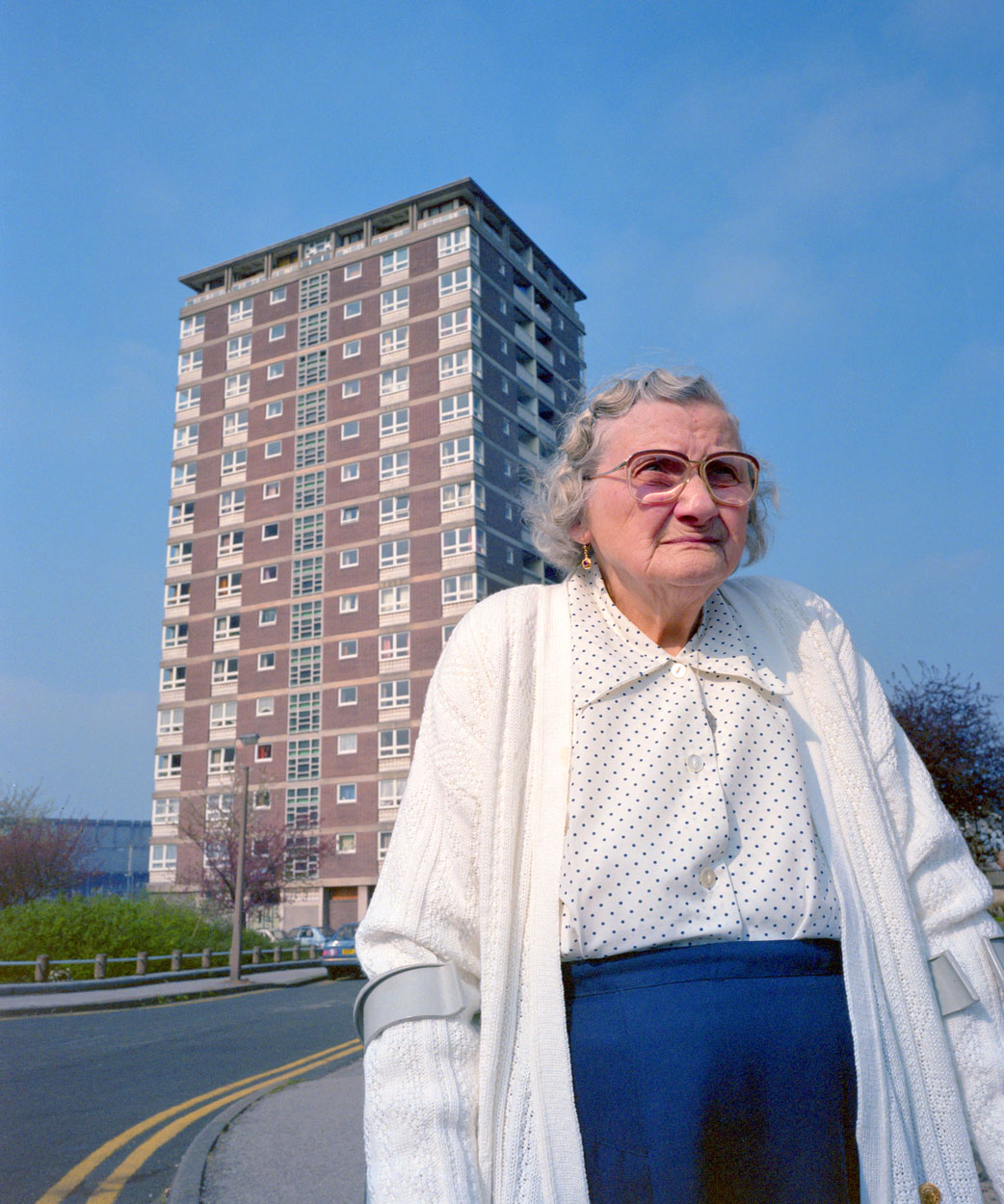
[HC 12] Annie Foster outside the Keating tower block.

[HC 13] Annie lives on the 12th floor of her tower block

[HC 14] Annie pegs her washing out on her balcony.
Keating is one of three identical 16 storey tower blocks built on Leverton Gardens which is part of the Lansdowne development complex, near London Road, Sheffield. It was built by Gleeson in 1963 and contains 58 two bedroomed flats.
Janine, Lee and baby Stephen
Interview with Janine
“We’ve lived in Kelvin Flats for 3 years and 3 months now. The main problem is noise that’s from the pub below, until 1 or 2 am every night, also the constant music from all sides and above. We’ve been keep awake with music from five flats away.
Last week there was a blues party at the other end of the block, none of us could sleep including the baby, at 3am we decided to get in the car and sleep at my dads place. We tried phoning the police, who said the had already received 70 phone calls complaining. The police never turned up, as usual they don’t like getting involved. We heard the blues party did not finish until 6am.
The trouble with this place is that some people do nothing all day and others who are bringing up children and working, they don’t mix. Friends and family don’t like visiting us here because of the filthy walkways and stinking lifts. Our grandparents are frightened using the lift and can’t climb so many stairs, so they never visit.
People are beaten up here for no reason at all. If you see someone breaking into a flat, you darn’t say anything because they will come after you for grassing on them.
Although you get problems wherever you are, we would like to live on the ground floor, have a garden for Steven to play in, and for me to feel safe when Lee’s at work. Every few weeks we’re always breaking down and having a cry in the bedroom. There’s always pressure living here“.
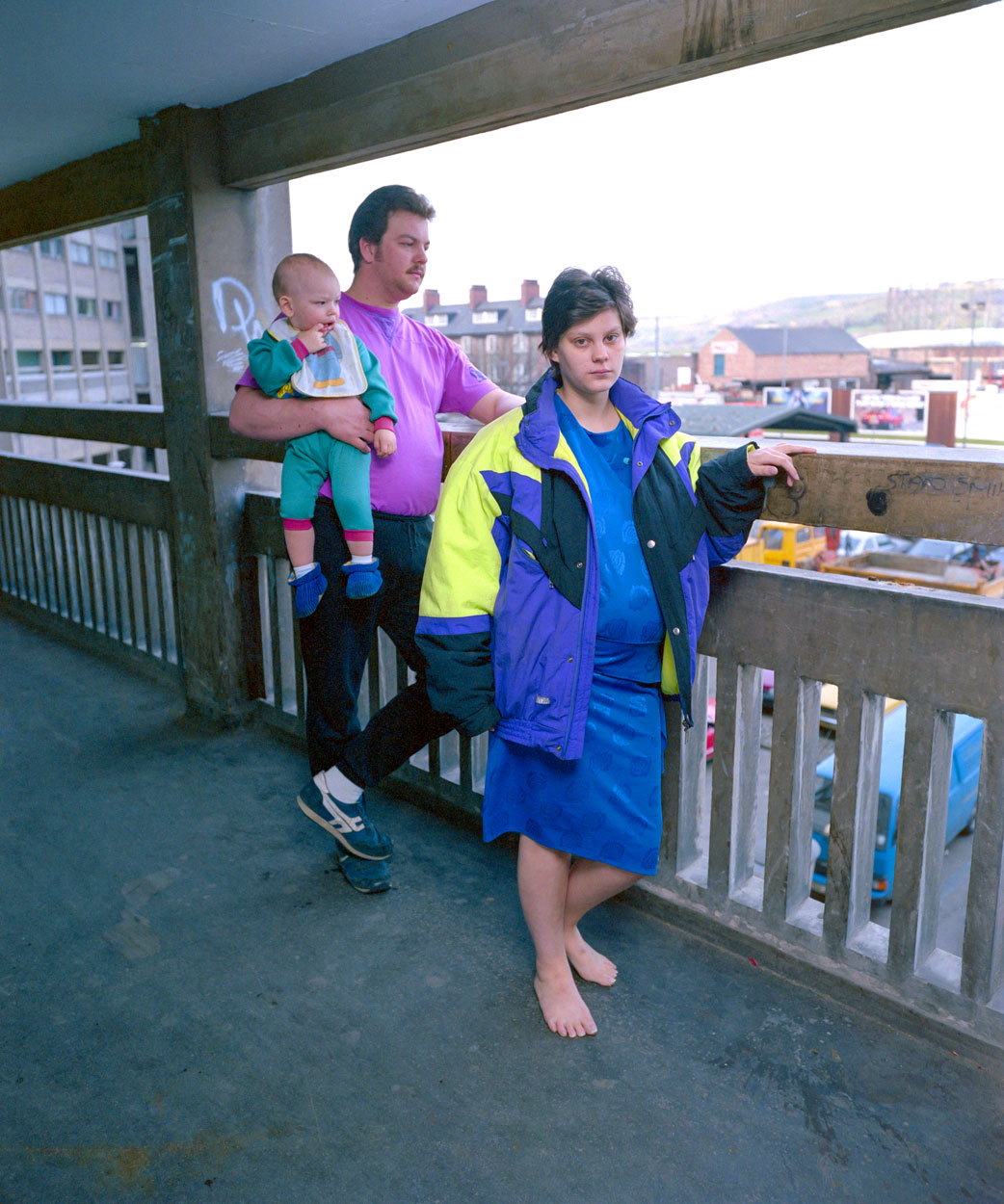
[HC 15] Janine, her partner Lee and baby Stephen on the walkway outside their flat at Kelvin Flats. Janine is pregnant with their second child.
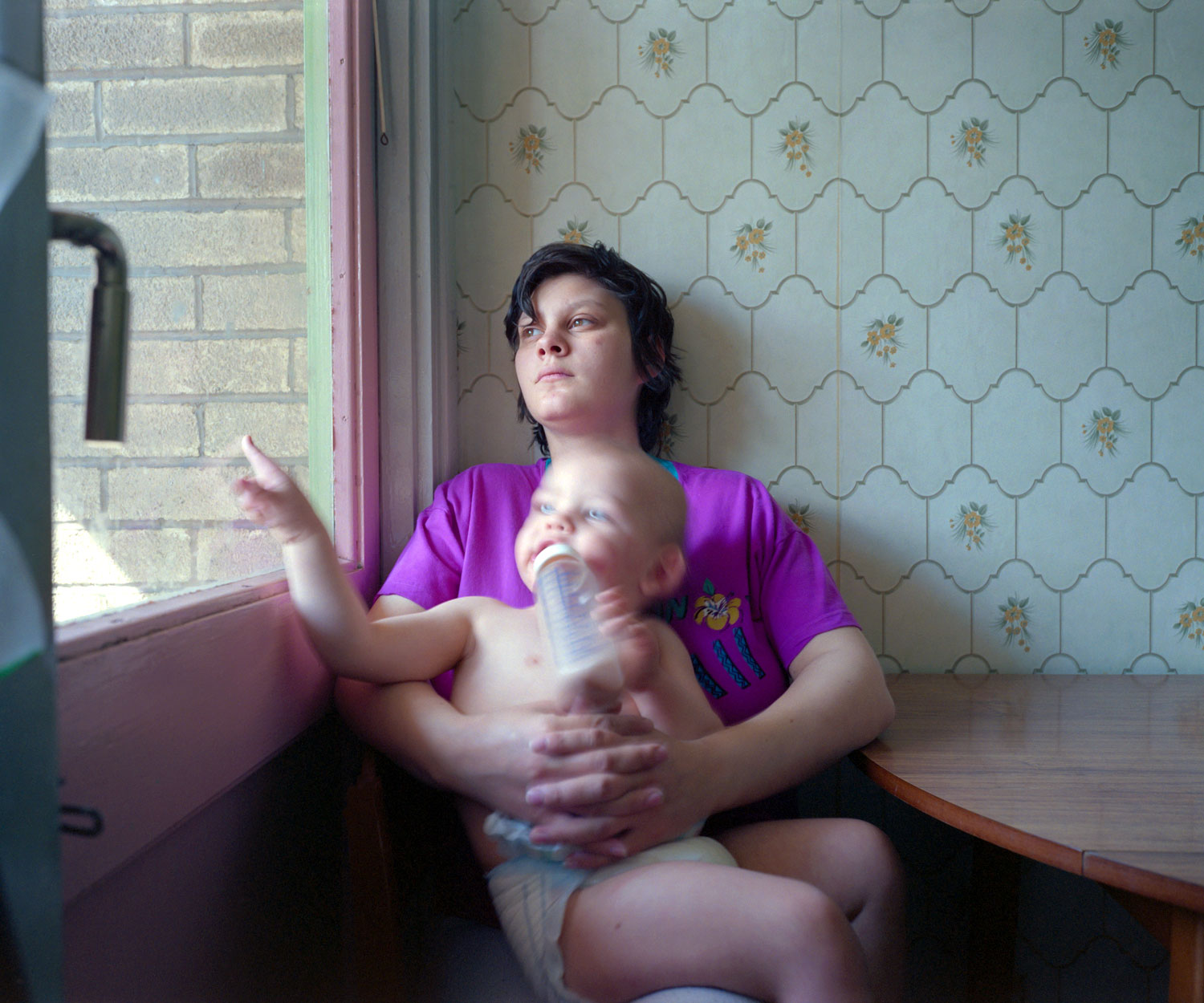
[HC 16] Janine and Stephen in the kitchen.
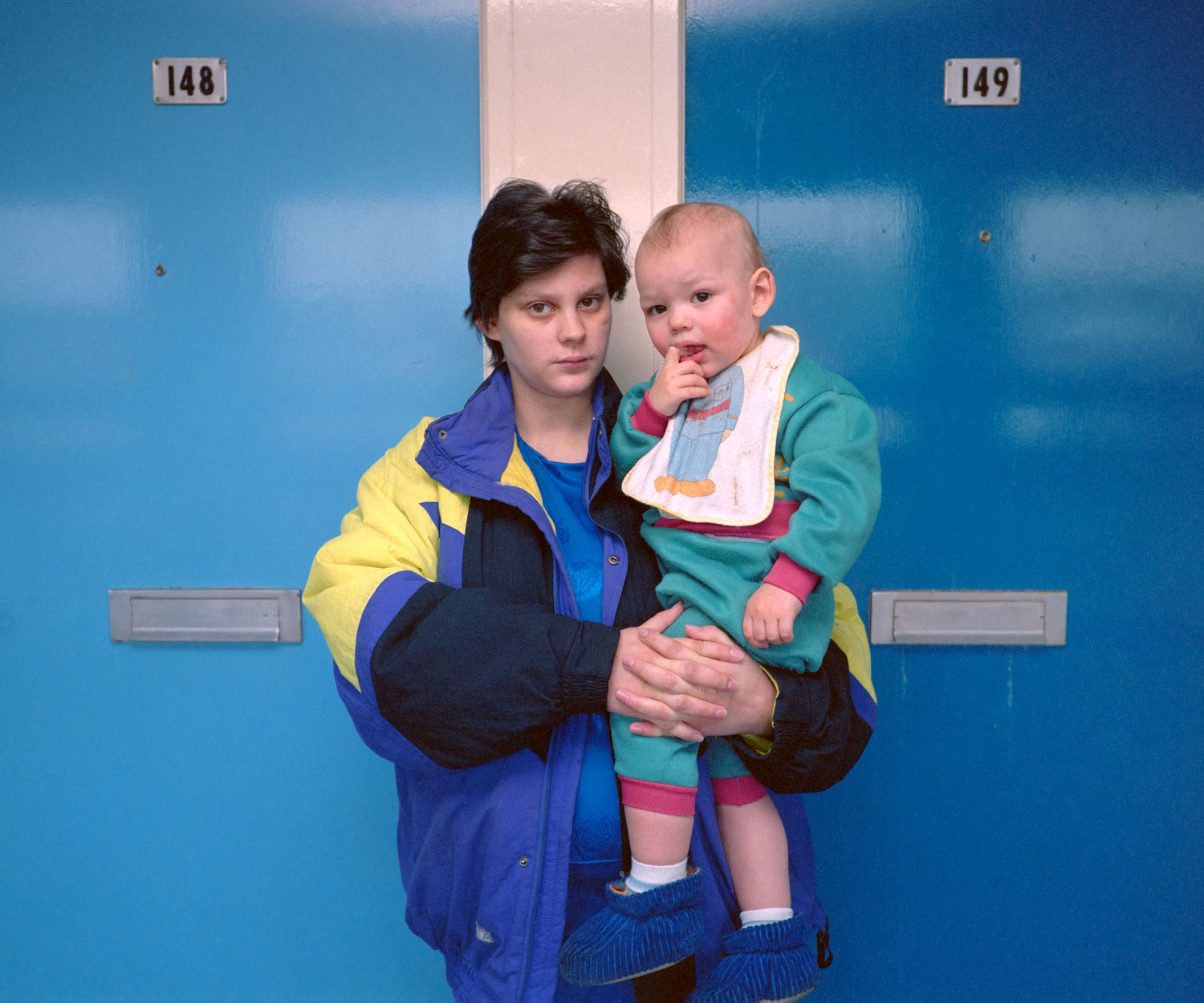
[HC 17] Janine and Stephen outside their flat.
Kelvin Flats located on Infirmary Road, Sheffield was built in 1967 and demolished in 1995. The building containing 948 flats which became unviable due to the collapse of the steel industry and associated population decline during the 1980’s and early 1990’s. Subsequent lack of maintenance led to severe structural disrepair, plus the conservative government’s policy of social engineering that encouraged the movement of council tenants into private housing.
Peter and Bessie Hill
“Bessy started developing her illness around 11 years ago, she was 57. It started with general absent mindedness, like forgetting to cook the meat for dinner or buttering the bread on both sides, that sort of thing. She was always angry with herself for forgetting things.
The point which made me realise that there was something very, very wrong was when Bessie could not find the bathroom, we had lived here a long time, it was incredible that she couldn’t remember where it was. I thought it might be a brain tumour, so she had all the tests and it showed up as Alzheimer’s disease.
As time moved on her confusion became obvious and needed full time help to stop her harming herself. My job was suffering as I had to spend more and more time with her. It reached a point when I couldn’t work and look after her as well, so I took redundancy.
Now, I don’t have much of a life, we rely on the DHSS for money. We rarely go out of the house because of the difficulties of getting round town. Getting Bessie to the toilet if we go out is impossible. Taking a grown woman into a man’s toilet is just as bad as me going into a woman’s toilet. People don’t understand, they only stare.
There’s no hope that Bessie will ever recover, even if there was a miracle cure. She will deteriorate, and will perhaps die from a fall, or pleurisy, or pneumonia, nobody dies from Alzheimer’s.
This means that I’m having to worry about everything; caring for Bessie, paying bills, dealing with the DHSS, with no social life to escape too“.
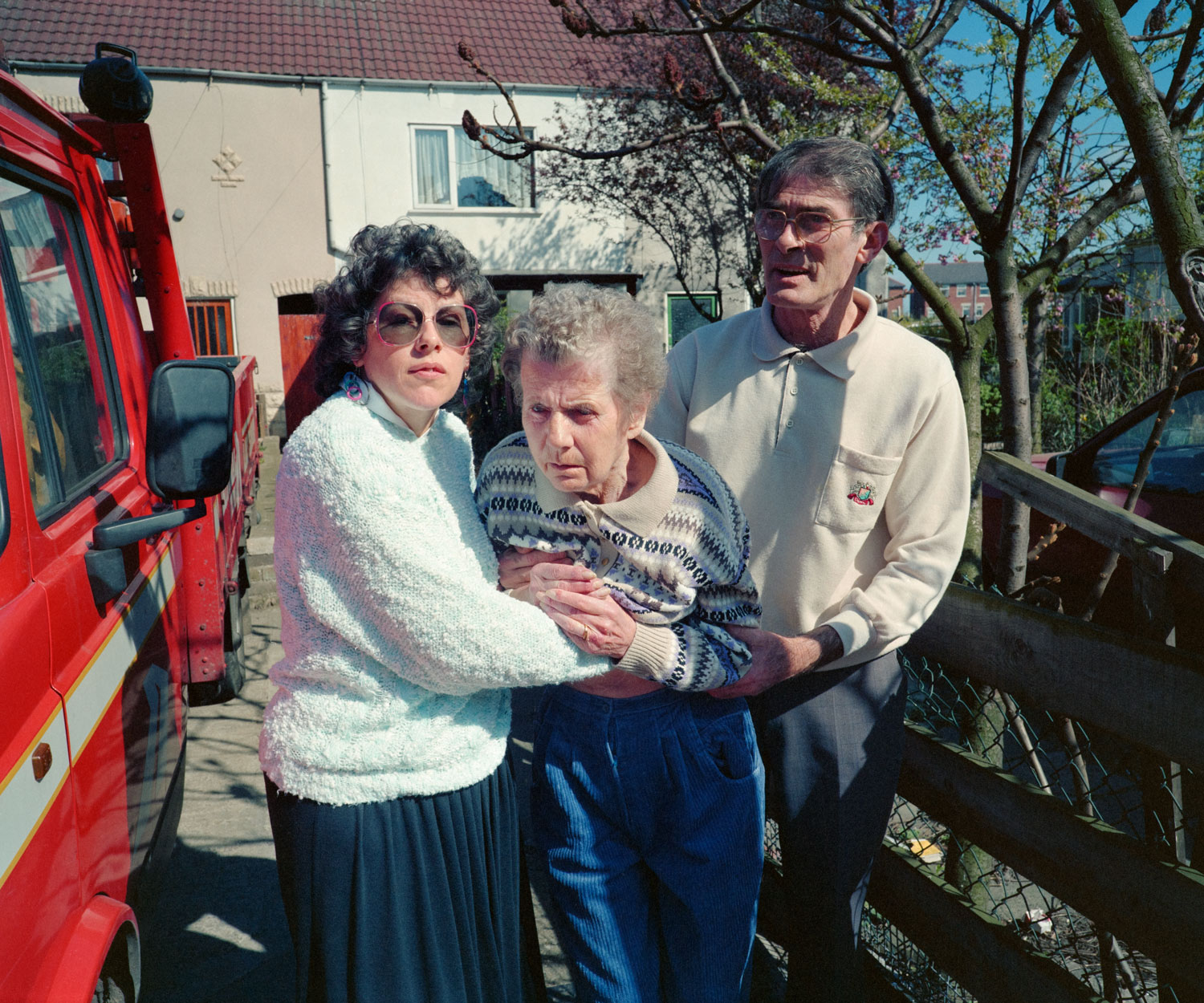
[HC 18] Bessie is helped by her husband Peter and a neighbour into their car for a doctor’s appointment.

[HC 19] Peter feeding Bessie.
Alzheimer’s is a type of dementia that affects memory, thinking and behaviour. The symptoms eventually grow so severe that they interfere with everyday activities.
Tony Bacon
“I worked for Edgar Allen foundry for 27 years before I was made redundant. Edgar Allen was closed with the loss of hundreds of jobs. All that’s left where it once stood is a carpark for Meadowhall shoppers. Five foundries, five famous names such as ‘Hadfields’ known through the world, lost forever and replaced by a hyped up Meadowhall, a shoppers paradise.
Men would retire after 51 years of service from the foundries, proud of their hard earned skills. Most of the work created at Meadowhall is part-time and low pay.
After I was made redundant, I had a feeling of extreme isolation, I’d had a sense of purpose while working, now I felt I was lost without identification. To be unemployed after 27 years of working leaves you in a limbo situation, it leads to stress, lack of confidence, worry, anxiety, depression and poverty.
The resulting illness caused by these are not I believe widely understood, least of all by the government which cares or knows little of the consequences of its actions. Any man or woman who has lived through my experiences will know that unemployment causes stress and then illness“.
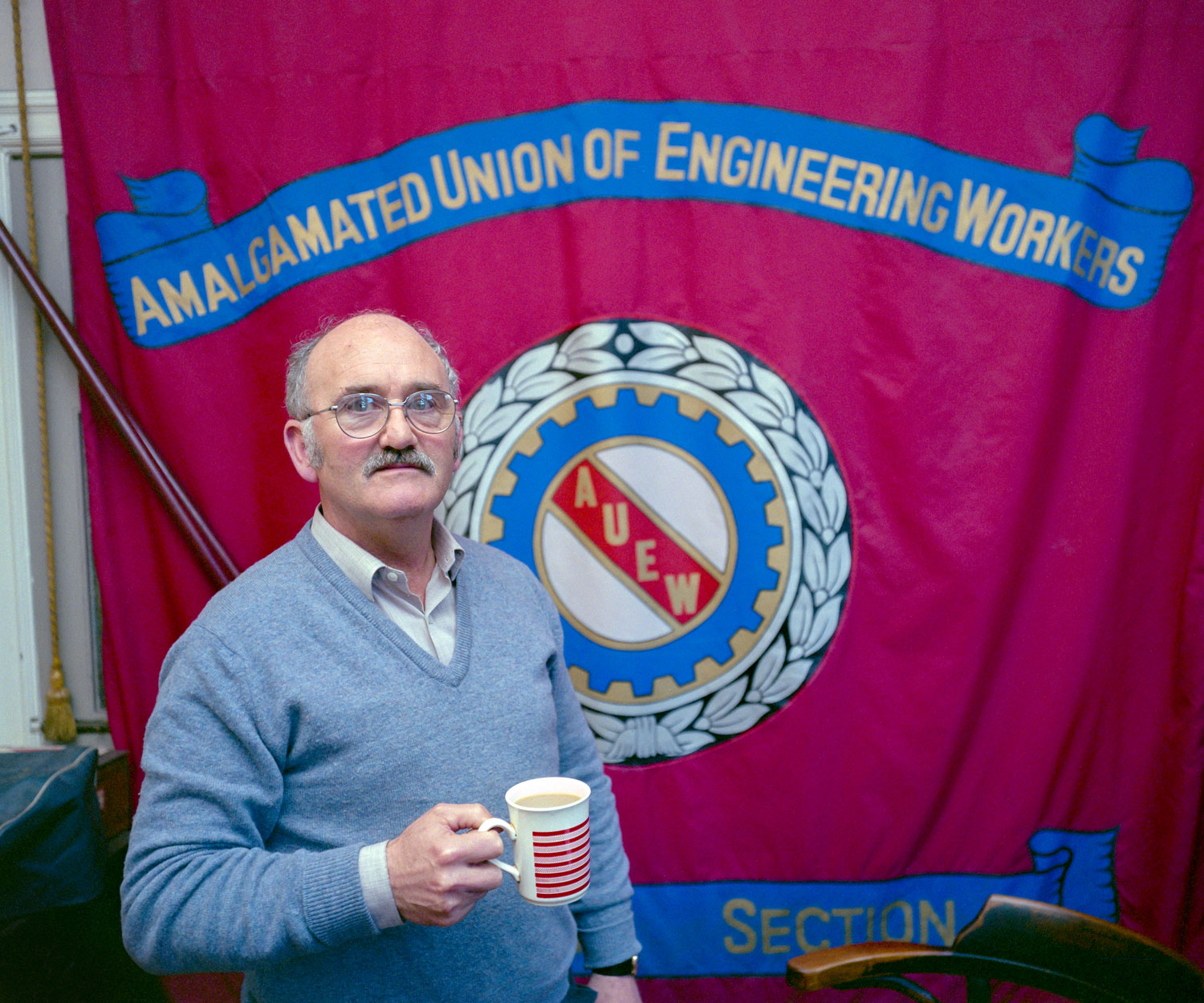
[HC 20] Tony in front of the Amalgamated Union of Engineering Workers banner.
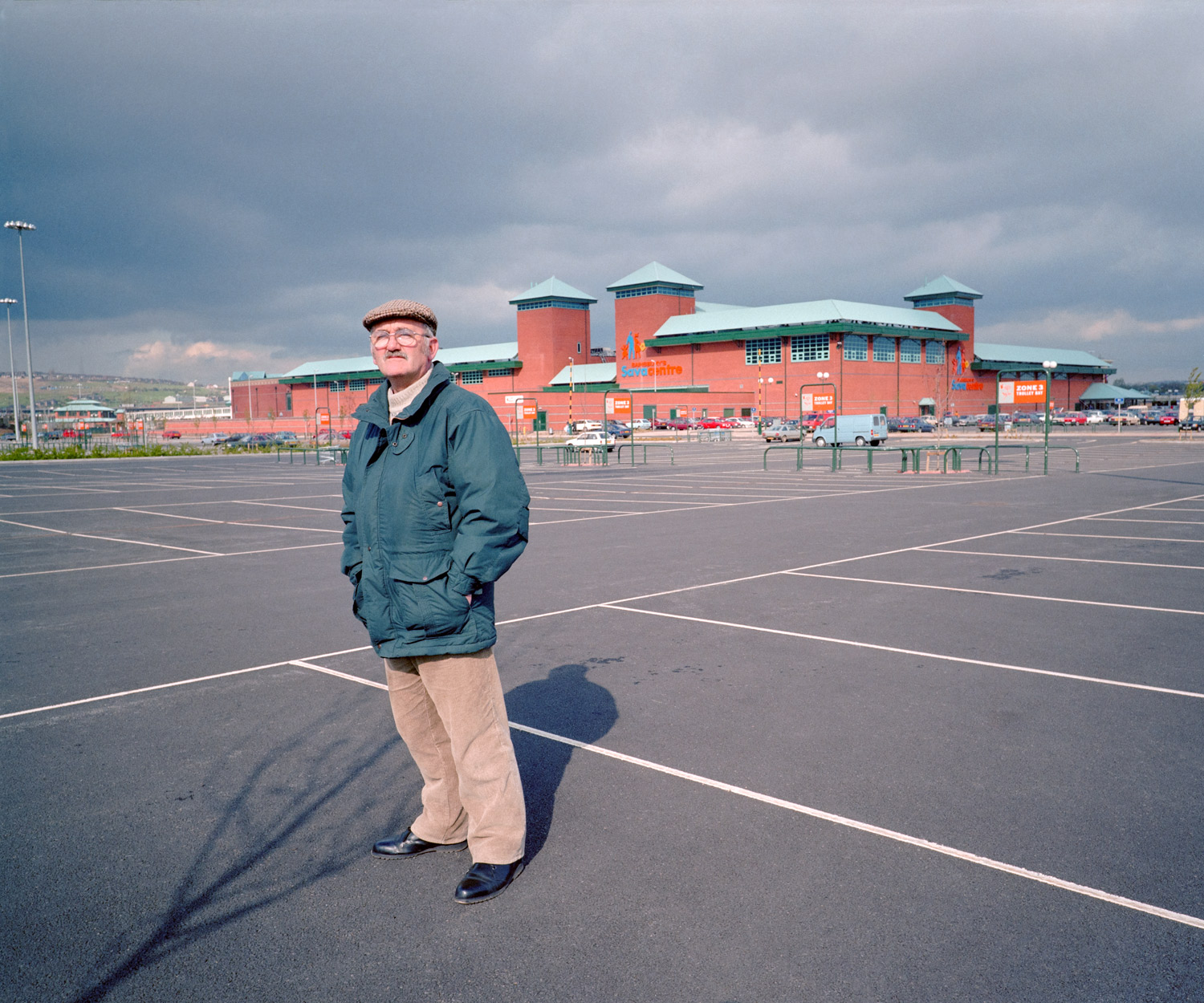
[HC 21] Tony standing at the Meadowhall shopping centre overflow carpark where the Edgar Allen foundry once stood.
Edgar Allen and Company was a steel maker and engineering company based in Tinsley, Sheffield, it was founded in the late 19th century and closed in 1989.
Mary
“My life changed in 1969, June 17th. I’d been visiting a friend and was waiting at a bus stop to get home. While I was waiting a car left the road and hit me, taking my legs off, it had faulty brakes the police said. I had broken thigh bones and a punctured bladder… they did not think I’d live… I often wish I hadn’t when things are bad.
The worst part was when my husband came to see me in hospital. It really upset me to have to have him see me so little, I felt I was only twelve inches tall. Other people can’t imagine it.
I didn’t go out for about five years after my accident. I didn’t like people looking at me, but it was also very hard getting about. People know that most public buildings have disabled facilities, but forget that relatives and friends don’t have ramps, lifts or wide toilets. At first I didn’t like mixing with other people in wheelchairs, I felt I didn’t belong with them.
It helped me a lot coming to the Kelvin Welfare Centre, I like to talk to other people, hear their views, think about there lives instead of thinking about my own problems. It’s important having somewhere to go. I feel sorry for other people who might be like me and can’t get out.
I’m 76 next year and I’m just starting to feel easy within myself, my life seems to have been one of worry, stress and strain. It’s seems sad to me now why I ever felt like that, now perhaps there’s strength in age“.
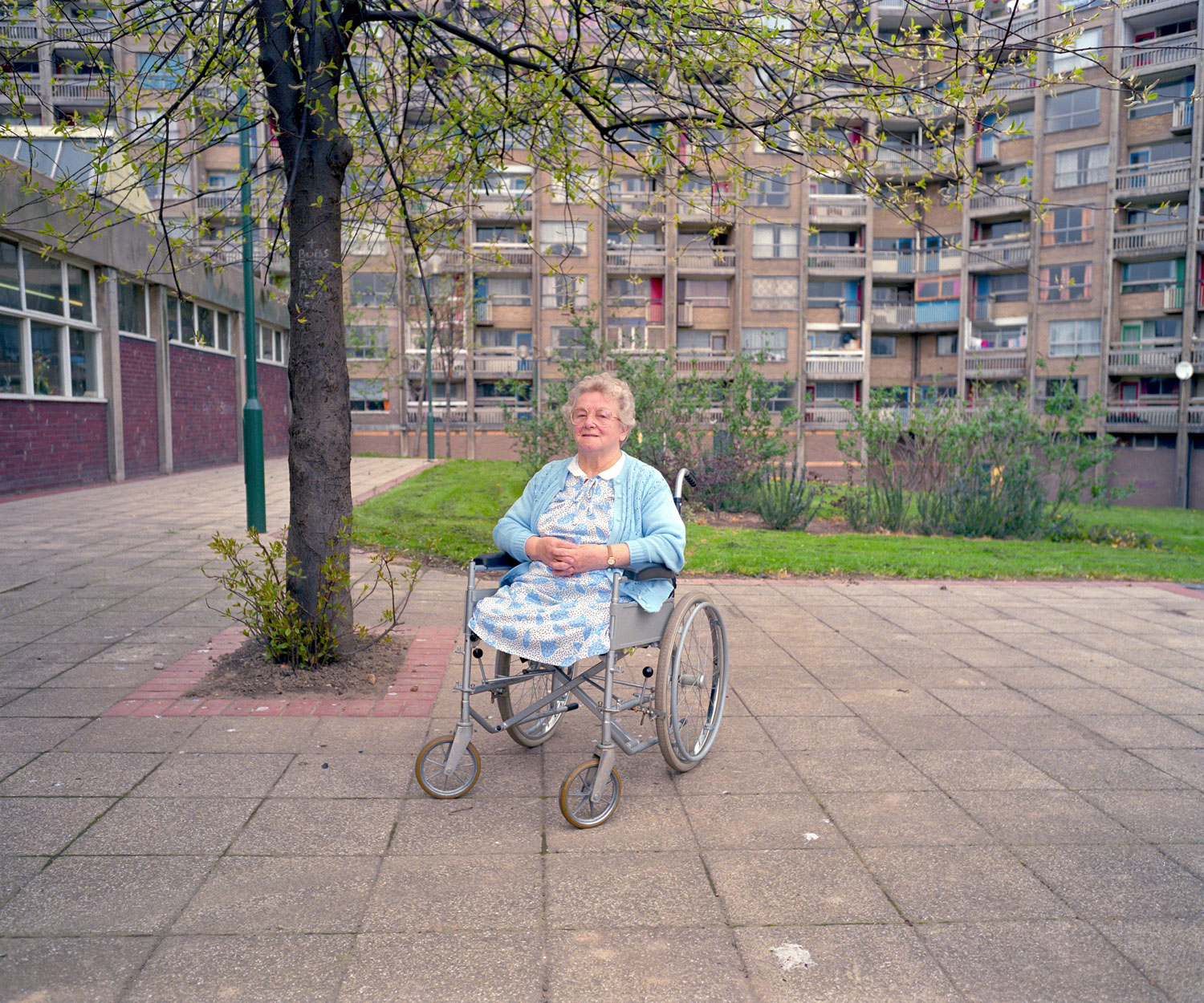
[HC 22] Mary outside the Kelvin Welfare Centre, Kelvin Flats are in the background.
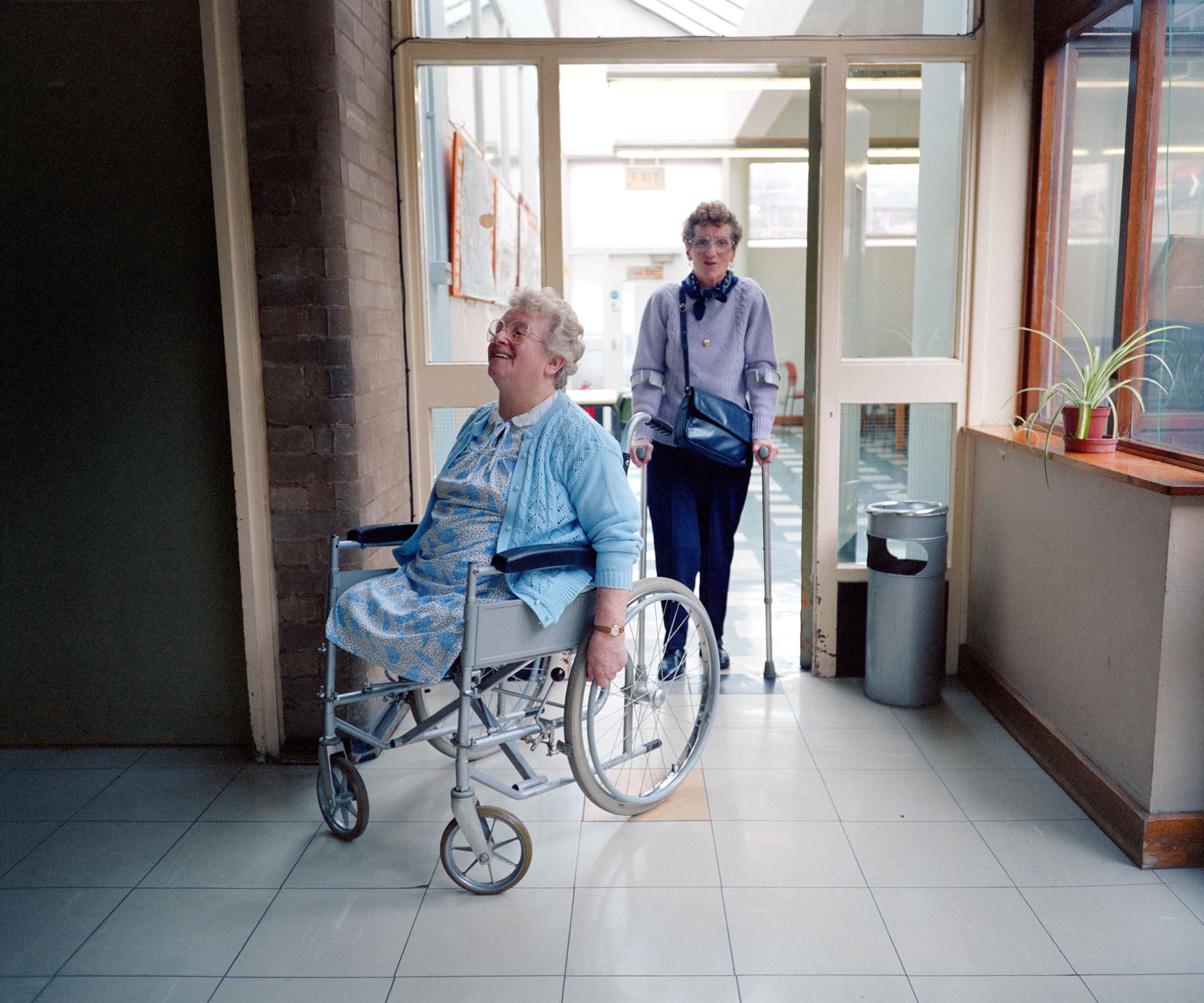
[HC 23] Mary and her friend in the Kelvin Welfare Centre.
Kelvin Flats and the peripheral supporting facilities to the flats were demolished in 1995.
Zafar Nazar
“We’ve been here in this shop just over a year, I’m 18 and work here 7 days a week. I think we are the only Asian shop at Parson Cross and that’s made things pretty bad. In the summer we’ve had gangs of up 50-60 kids aged about 15 just hanging around outside, that’s scares a lot of our customers off. Then the kids come in the shop and start shoplifting and giving abuse calling me ‘black bastard’ and other things. What can you do when they are only kids? I always have to make the effort to try and be nice and forget about it. You can’t say anything back to them as they will have you.
People abuse you in different ways, some just call you a ‘paki’, others do it in a different way, they just don’t talk to you, they just stare at you, put the money down and go out. One night we had our windows broken and so did the Chinese takeaway. This situation makes me feel powerless, other shop keepers aren’t treated like this, its pure racism, we’ve had our windows broken and somebody tried to set fire to the back of the shop.
All this stress gets to me and I start feeling I’m missing out on a better life. My family want me to stick it out here and come a successful business man. They want too much from me. However I don’t think I will last another year here. What I’d really like to do at the moment is become a police cadet. Given the opportunity to change my life, I will take it“.
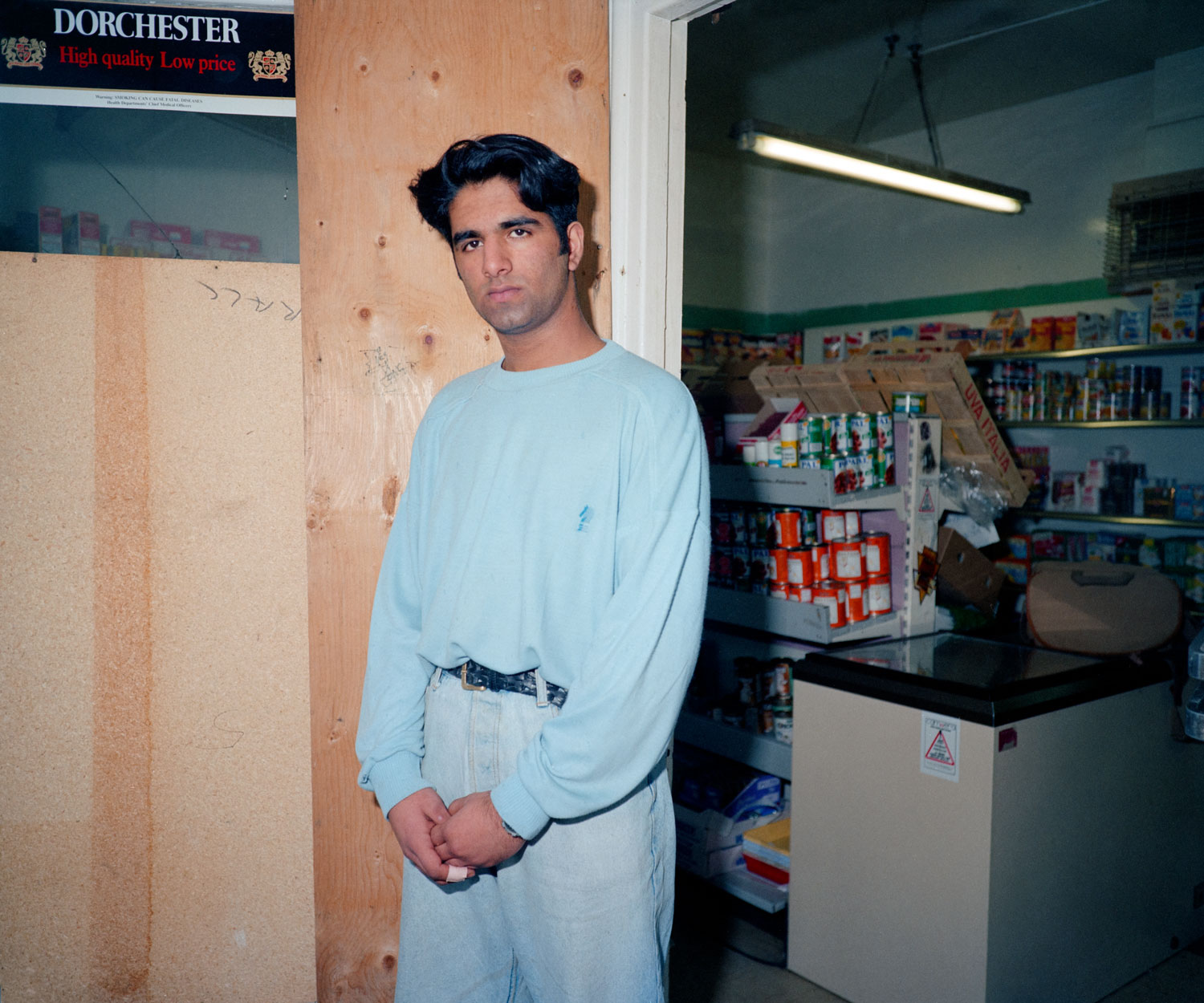
[HC 24] Zafar outside the boarded window of his shop recently smashed by local racists.

[Hc 25] Zafar outside his shop in a sleet storm.
Parson Cross is a social housing estate on the outskirts of Sheffield. Built in 1938 and 1948, it contains over 10,000 houses housing approximately 50,000 people and was once Europe’s largest housing conurbation.
Billy Gates
“I’ve been working at this foundry as a stamper at Turton and Platts for 24 years, since I was 20. It’s a good firm to work for, the gaffers fair, I’ve mates here and the money’s OK. I get about £55.00 for the 6am to 2pm shift. Its piece work so its up and down. Health wise the drawbacks from this job are aches, rheumatism, bad chest and loss of hearing. I also suffer from eczema and I guess that has a lot to do with the job.
I’m worried how I’ll be able to carry on when I’m older. Nobody can do this job until retirement age, most are finished by 55. Men used to be put on light work in another part of the foundry at that age, now they are paid off (made redundant). Although this is hard work, I don’t think I’ll cope when I’m paid off.
Sometimes it gets so hot in summer you have to stop work, but because you are on a piece rate, you have to keep going. In winter with the heat of the furnace on your front and the cold on your back, that puts a strain in you. You keep going because you can’t let your mates down.
I’ve three children and I wouldn’t want them to work here, there are better jobs than this anywhere”.

[HC 01] Billy Gates (centre) with his work mates.

[HC 02] Billy (front) heating a steel ingot in a furnace. The steel ingot is held in the furnace by long tongs until it is malleable enough to be shaped in a drop stamping forge.

[HC 03] Billy moving the red hot steel ingot in a trolley from the furnace to the drop stamping forge.

[HC 04] The drop stamping forge in operation.
George Turton, Platts and Co Ltd was located on Saville Street, Sheffield. They manufactured railway buffers, springs and associated stampings. During WW2 they made aircraft engine crank cases and cylinder linings. The company was established in 1882 and went into voluntary liquidation in 2011.
Gaynor Prescott
“I left home when I was 14. I’d met a lad from a fairground and travelled around with him. I worked on the hot dog stand, but got fed up of standing in the cold all day. When I wanted to come home my parents wouldn’t have me back, so I’ve been on my own ever since.
I’ve got three kids now, Lotte, Amber and Julie, I had Julie when I was 17, I’m 21 now and live on my own. I don’t mix with any girls of my age who don’t have kids, they can’t stand them for long, so I spent most of my time alone. Apart from going out for a couple of hours on my 21st birthday, I have not been out much since I was 17.
My hardest problem is trying to pay my bills when they come in, with two babies in nappies money is soon gone. I’m left each week after my bills with £20-30 for food and clothes for the four of us. I make sure the kids get everything, but it means I have to do without. I’ve needed a new pair of shoes for the last 3 years. I’ve been saving the family allowance for the last two months to buy some new tracksuits. Their dad don’t pay anything for the kids because he does not work and hasn’t any money.
I feel I’m missing out on going to work and earning some decent money. I keep myself going by thinking when they grow up I’ll still be young enough to do things I want to do, and then I’ll have my life back. I’m fed up of sitting by the fire pulling my hair out “.

[HC 05] Gaynor with two of her children in the kitchen.

[HC 06] Gaynor contemplates her life.

[HC 07] Gaynor bottle feeds her new baby.

[HC 08] Gaynor takes her children out to Crookes Valley Park to play.
George Turner
“I moved here to the Edward Street Flats with my mother in 1940, I now live here with my son Eric. I had a stroke 3 years ago and have had to give up work as a porter at the university, the stroke has affected my balance and so I spend a lot of time in this room.
The council has been working on this building opposite for the last 12 months and its expected to go on for another 12. During this time I have had to put up with the disruption, dust and noise daily from 8.00am until 4.30pm. Its the drilling and engine noise of the heavy crane when it’s lifting that’s worse. All I can do is turn the television up and try to drown out the noise. I know we could have been moved by the council, but I don’t want to move, I’ve been here too long too change.
Perhaps what’s worst is that the noise is regular. I’ve always lived quietly and all this noise causes a strain for me, its always there and is its very hard to get away from it. Its hard to concentrate on anything other than the constant aggressive noise, it upsets your nerves. It’s like having your privacy invaded everyday at 8am“.

[HC 09] George watches the building work opposite.

[HC 10] George watches the building work opposite. His TV is on all day to drown out the sound of building work opposite his flat.

[HC 11] George has his TV volume turned up high in an attempt to mask the noise from outside.
The Edward Street Flats, located near West Street, Sheffield are a four storey social housing complex built during the 1930’s, they contain 144 flats.
Annie Foster
“I’ve been living in this tower block for 14yrs, the last 5 have been on my own since my husband died. The main problem living up here is loneliness and that as I get older (I’m 81 next year), I will become more and more dependant on other people and that bothers me.
We used to live in Washington Road with four houses to each backyard, we had friends all the way down the road. It’s not that the people up here are not friendly, it’s just that you only get to see them in a lift for a moment and then they are gone. I’ve sat up here week after week without seeing anyone else. Here you have to make a big effect to go out, otherwise life passes you by.
It was very hard living here after my husband died. I didn’t really start feeling better until I got rid of everything that had belonged to him, especially the chair he used to sit in. I had to have it taken away because I could still see him sitting in it. I had to get over it the best way I could and that seemed to help. If there had been people around me to talk to about it and keep me busy, I think it would have been easier to get through. I spent 2 years thinking that there was nothing to live for, but as time goes by you realise there is“.

[HC 12] Annie Foster outside the Keating tower block.

[HC 13] Annie lives on the 12th floor of her tower block

[HC 14] Annie pegs her washing out on her balcony.
Keating is one of three identical 16 storey tower blocks built on Leverton Gardens which is part of the Lansdowne development complex, near London Road, Sheffield. It was built by Gleeson in 1963 and contains 58 two bedroomed flats.
Janine, Lee and baby Stephen
Interview with Janine
“We’ve lived in Kelvin Flats for 3 years and 3 months now. The main problem is noise that’s from the pub below, until 1 or 2 am every night, also the constant music from all sides and above. We’ve been keep awake with music from five flats away.
Last week there was a blues party at the other end of the block, none of us could sleep including the baby, at 3am we decided to get in the car and sleep at my dads place. We tried phoning the police, who said the had already received 70 phone calls complaining. The police never turned up, as usual they don’t like getting involved. We heard the blues party did not finish until 6am.
The trouble with this place is that some people do nothing all day and others who are bringing up children and working, they don’t mix. Friends and family don’t like visiting us here because of the filthy walkways and stinking lifts. Our grandparents are frightened using the lift and can’t climb so many stairs, so they never visit.
People are beaten up here for no reason at all. If you see someone breaking into a flat, you darn’t say anything because they will come after you for grassing on them.
Although you get problems wherever you are, we would like to live on the ground floor, have a garden for Steven to play in, and for me to feel safe when Lee’s at work. Every few weeks we’re always breaking down and having a cry in the bedroom. There’s always pressure living here“.

[HC 15] Janine, her partner Lee and baby Stephen on the walkway outside their flat at Kelvin Flats. Janine is pregnant with their second child.

[HC 16] Janine and Stephen in the kitchen.

[HC 17] Janine and Stephen outside their flat.
Kelvin Flats located on Infirmary Road, Sheffield was built in 1967 and demolished in 1995. The building containing 948 flats which became unviable due to the collapse of the steel industry and associated population decline during the 1980’s and early 1990’s. Subsequent lack of maintenance led to severe structural disrepair, plus the conservative government’s policy of social engineering that encouraged the movement of council tenants into private housing.
Peter and Bessie Hill
“Bessy started developing her illness around 11 years ago, she was 57. It started with general absent mindedness, like forgetting to cook the meat for dinner or buttering the bread on both sides, that sort of thing. She was always angry with herself for forgetting things.
The point which made me realise that there was something very, very wrong was when Bessie could not find the bathroom, we had lived here a long time, it was incredible that she couldn’t remember where it was. I thought it might be a brain tumour, so she had all the tests and it showed up as Alzheimer’s disease.
As time moved on her confusion became obvious and needed full time help to stop her harming herself. My job was suffering as I had to spend more and more time with her. It reached a point when I couldn’t work and look after her as well, so I took redundancy.
Now, I don’t have much of a life, we rely on the DHSS for money. We rarely go out of the house because of the difficulties of getting round town. Getting Bessie to the toilet if we go out is impossible. Taking a grown woman into a man’s toilet is just as bad as me going into a woman’s toilet. People don’t understand, they only stare.
There’s no hope that Bessie will ever recover, even if there was a miracle cure. She will deteriorate, and will perhaps die from a fall, or pleurisy, or pneumonia, nobody dies from Alzheimer’s.
This means that I’m having to worry about everything; caring for Bessie, paying bills, dealing with the DHSS, with no social life to escape too“.

[HC 18] Bessie is helped by her husband Peter and a neighbour into their car for a doctor’s appointment.

[HC 19] Peter feeding Bessie.
Alzheimer’s is a type of dementia that affects memory, thinking and behaviour. The symptoms eventually grow so severe that they interfere with everyday activities.
Tony Bacon
“I worked for Edgar Allen foundry for 27 years before I was made redundant. Edgar Allen was closed with the loss of hundreds of jobs. All that’s left where it once stood is a carpark for Meadowhall shoppers. Five foundries, five famous names such as ‘Hadfields’ known through the world, lost forever and replaced by a hyped up Meadowhall, a shoppers paradise.
Men would retire after 51 years of service from the foundries, proud of their hard earned skills. Most of the work created at Meadowhall is part-time and low pay.
After I was made redundant, I had a feeling of extreme isolation, I’d had a sense of purpose while working, now I felt I was lost without identification. To be unemployed after 27 years of working leaves you in a limbo situation, it leads to stress, lack of confidence, worry, anxiety, depression and poverty.
The resulting illness caused by these are not I believe widely understood, least of all by the government which cares or knows little of the consequences of its actions. Any man or woman who has lived through my experiences will know that unemployment causes stress and then illness“.

[HC 20] Tony in front of the Amalgamated Union of Engineering Workers banner.

[HC 21] Tony standing at the Meadowhall shopping centre overflow carpark where the Edgar Allen foundry once stood.
Edgar Allen and Company was a steel maker and engineering company based in Tinsley, Sheffield, it was founded in the late 19th century and closed in 1989.
Mary
“My life changed in 1969, June 17th. I’d been visiting a friend and was waiting at a bus stop to get home. While I was waiting a car left the road and hit me, taking my legs off, it had faulty brakes the police said. I had broken thigh bones and a punctured bladder… they did not think I’d live… I often wish I hadn’t when things are bad.
The worst part was when my husband came to see me in hospital. It really upset me to have to have him see me so little, I felt I was only twelve inches tall. Other people can’t imagine it.
I didn’t go out for about five years after my accident. I didn’t like people looking at me, but it was also very hard getting about. People know that most public buildings have disabled facilities, but forget that relatives and friends don’t have ramps, lifts or wide toilets. At first I didn’t like mixing with other people in wheelchairs, I felt I didn’t belong with them.
It helped me a lot coming to the Kelvin Welfare Centre, I like to talk to other people, hear their views, think about there lives instead of thinking about my own problems. It’s important having somewhere to go. I feel sorry for other people who might be like me and can’t get out.
I’m 76 next year and I’m just starting to feel easy within myself, my life seems to have been one of worry, stress and strain. It’s seems sad to me now why I ever felt like that, now perhaps there’s strength in age“.

[HC 22] Mary outside the Kelvin Welfare Centre, Kelvin Flats are in the background.

[HC 23] Mary and her friend in the Kelvin Welfare Centre.
Kelvin Flats and the peripheral supporting facilities to the flats were demolished in 1995.
Zafar Nazar
“We’ve been here in this shop just over a year, I’m 18 and work here 7 days a week. I think we are the only Asian shop at Parson Cross and that’s made things pretty bad. In the summer we’ve had gangs of up 50-60 kids aged about 15 just hanging around outside, that’s scares a lot of our customers off. Then the kids come in the shop and start shoplifting and giving abuse calling me ‘black bastard’ and other things. What can you do when they are only kids? I always have to make the effort to try and be nice and forget about it. You can’t say anything back to them as they will have you.
People abuse you in different ways, some just call you a ‘paki’, others do it in a different way, they just don’t talk to you, they just stare at you, put the money down and go out. One night we had our windows broken and so did the Chinese takeaway. This situation makes me feel powerless, other shop keepers aren’t treated like this, its pure racism, we’ve had our windows broken and somebody tried to set fire to the back of the shop.
All this stress gets to me and I start feeling I’m missing out on a better life. My family want me to stick it out here and come a successful business man. They want too much from me. However I don’t think I will last another year here. What I’d really like to do at the moment is become a police cadet. Given the opportunity to change my life, I will take it“.

[HC 24] Zafar outside the boarded window of his shop recently smashed by local racists.

[Hc 25] Zafar outside his shop in a sleet storm.
Parson Cross is a social housing estate on the outskirts of Sheffield. Built in 1938 and 1948, it contains over 10,000 houses housing approximately 50,000 people and was once Europe’s largest housing conurbation.
All images are Strictly Copyright © Bill Stephenson All Rights Reserved
